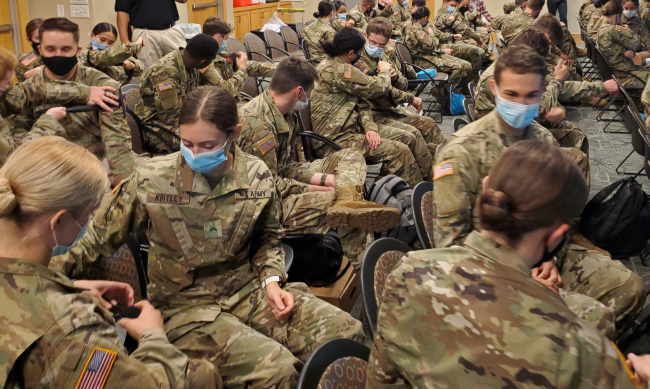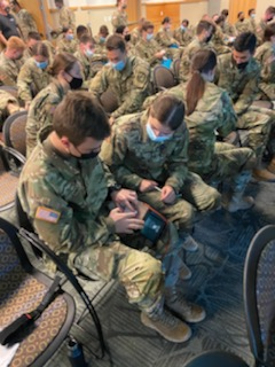
Cadets in Vanderbilt’s Army Reserve Officers Training Corps recently teamed up with Vanderbilt University Medical Center instructors to learn lifesaving techniques first developed on the battlefield.
The cadets participated in a Stop the Bleed course at The Commons Center on Oct. 28. Stop the Bleed offers training in basic bleeding control techniques, such as direct pressure, wound packing and tourniquet application—treatments perfected on the field of combat during the wars in Iraq and Afghanistan resulting in significantly fewer deaths.
The American College of Surgeons collaborated with the U.S. military to develop the Stop the Bleed initiative, which is designed to empower civilian bystanders to perform lifesaving treatment before first responders can arrive on the scene of an accident or injury.

“This training will be valuable for our cadets as both future military officers and over the course of their lifetimes,” said Army ROTC instructor Brandon Hulette. “Stop the Bleed is another vital tool for their toolkits as leaders in the military as well as in the broader community.”
Since the program’s inception in 2016, Vanderbilt’s Division of Trauma and Surgical Critical Care has trained thousands of school nurses, teachers, resource officers, day care center workers, medical students and more. VUMC continues to offer the free, one-hour course to interested groups throughout Middle Tennessee. The larger program has trained more than 1.5 million people nationwide.
Course participants learn how to apply compression, pack a wound and use a tourniquet. At the conclusion of the course, the training site receives a kit complete with gloves, gauze, a tourniquet and instructions for use in the event they are needed.
This summer, the Tennessee General Assembly passed House Bill 0212, which authorizes local education agencies to develop and implement Stop the Bleed programs in consultation with local law enforcement beginning with the 2021-22 academic year. It was signed into law by Tennessee Gov. Bill Lee and took effect July 1.
“I sincerely appreciate the Vanderbilt trauma surgeons and their American College of Surgeons colleagues who brought this lifesaving program to our attention,” Rep. John Clemmons, a co-sponsor of the bill, said at the time. “Their commitment to volunteerism and public health is saving lives every day.”
For more information about Stop the Bleed at VUMC, contact catherine.s.wilson@vumc.org or christopher.brown.3@vumc.org.